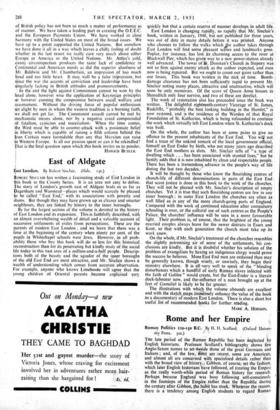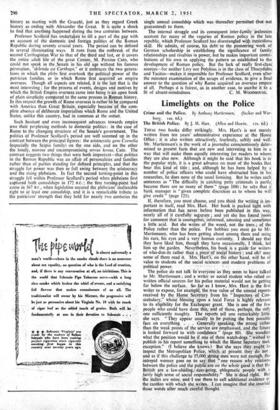Rome and her Empire
Roman Politics no-vso B.C. By H. H. Scullard. (Oxford Univer-
sity Press. 303.) Die late period of the Roman Republic has been neglected by English historians. Professor Scullard's bibliography shows few Anglo-Saxon names to set-beside those of the great Germans and Italians ; and, of the few, illOst are recent, some are American, and almost all are concerned with specialised details rather than with the broad view of history.. Gibbon, of course, set the fashion, which later English historians have followed, of treating the Empire as the really worth-while period of Roman history for research. Perhaps because England was busy following self-consciously in the footsteps of the Empire rather than the Republic during the century after Gibbon, the habit has stuck. Whatever the reason, there is a tendency among English students to regard Roman
history as starting with the Gracchi, just as they regard Greek history as ending with Alexander the Great. It is quite a shock to find that anything -happened during the two centuries between.
Professor Scullaid has undeitaken to fill a part of the gap with an account of the domestic and foreign politics of the Roman Republic during seventy crucial years. The period can be defined in several illuminating ways. It runs from the outbreak of the second Carthaginian War to that of the third and last, or it covers the entire adult life' of the great Censor, M. Porcius Cato, who could not speak in the,Senate in his old age without his famous peroration, "delenda est Carthago," or it embraces the two genera- tions in which the plebs first overtook the political- }sower of the patrician families, 01 in which Rome first acquired an empire overseas. Though all aspects are related, it is the last that is the most interesting ; for the process of events, designs and motives by which the British Empire overseas came into being is an open book of plain simplicity compared to the same process in Roman history. In this respect the growth of RoMe overseas is rather to be compared with America than Great Britain, especially because of the com- plete absence of deliberate imperialism which Rome and the United States, unlike this country, had in common at the outset.
Such .hesitant and even inconsequent advances towards empire owe their perplexing methods to domestic politics: in the case of Rome to the changing structure of the Senate's government. The politics of Professor Scullard's period are well summed up in the contrast between the principal figures: the aristocratic gees Cornelia (especially the Scipio family) on the one side, and on the other the lonely, morose and uncompromising novus homo, Cato. The contrast suggests two things that were both important—that politics in the Roman Republic was an affair of personalities and- families rather than of parties standin? for defined principles, and that the struggle for power was then tn full swing between the aristocracy and the rising plebeians. In fact the second turning-point in this struggle fell within Professor Scullard's period whenplebeians first captured both consulships in 172 B.c. ; the first turnmg-point had come in 367 a.c., when legislation secured the plebeians' inalienable right to at least one consulship, and it is a remarkable tribute to the patricians' strength that they held for nearly two centuries the
single annual consulship which was thereafter permitted (but not guaranteed) to them.
The internal struggle and its consequent inter-family' jealousies account for many of the vagaries of Roman policy in the late republic, which Professor Scullard has disentangled with meticulous skill. He admits, of course, his debt to the pioneering work of German scholarship in establishing the significance of family relationships and rivalries in power, but he makes important contri- butions of his own in applying the pattern so established to the development of Roman policy. But the lack of really first-class' sources—for neither Livy nor Polybius is in the class of Thucydides and Tacitus—makes it impossible for Professor Scullard, even after the minutest examination of the scraps of evidence, to 'give a final answer to the question of why Rome acquired an overseas empire at all. Perhaps it is fairest, as in another case, to ascribe it to a



































 Previous page
Previous page